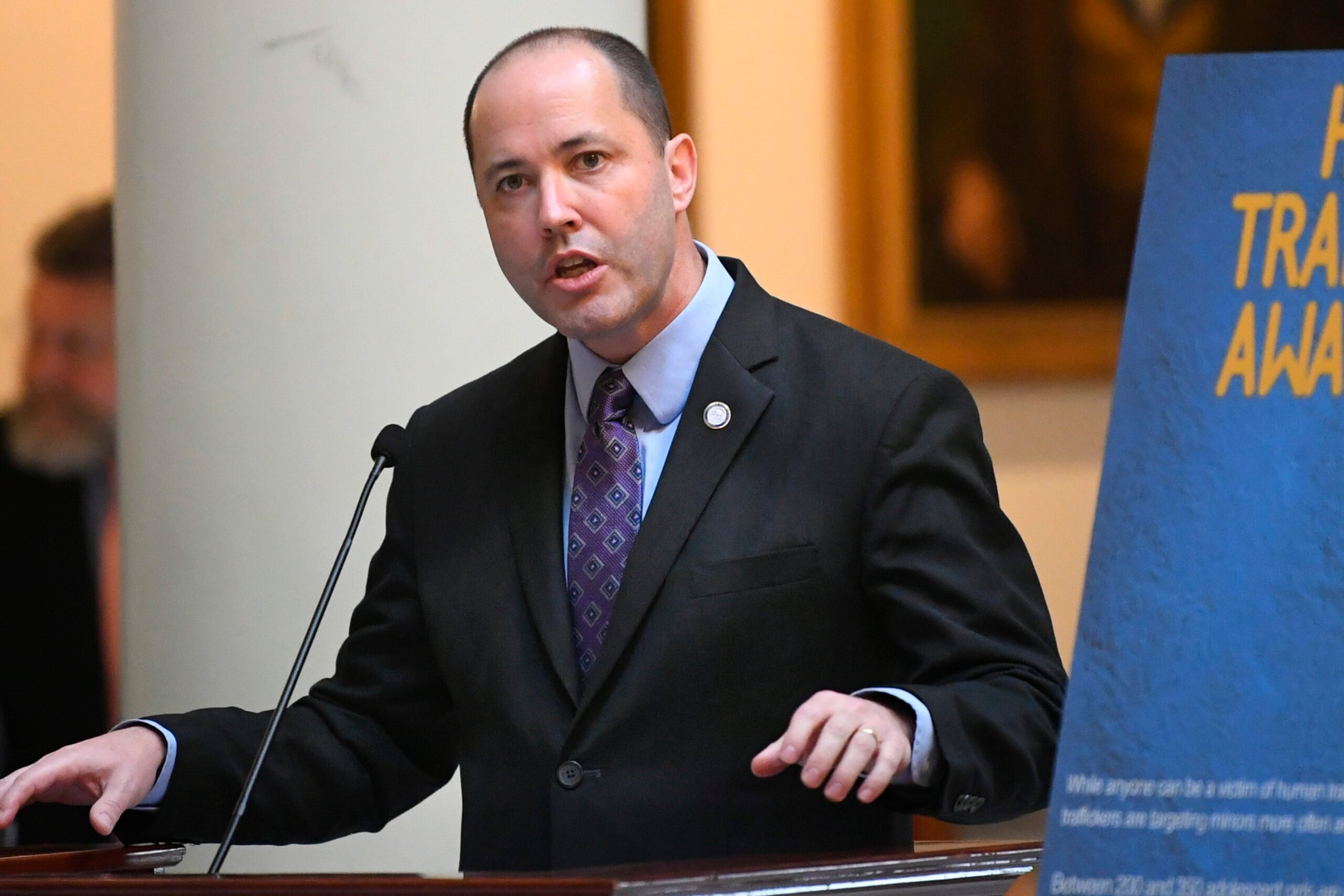Carlie Brown and Molly Pela had big plans for a big wedding in the spring of 2023.
The ceremony and reception would be held at a lovely restaurant near the park where they’d watched an outdoor movie on their first date. They’d hire a DJ and maybe throw a bachelorette party into the mix. More importantly, they’d give out-of-town friends and family plenty of time to make travel arrangements for the nuptials in Houston, where the couple now lives.
“We wanted some of the traditional fanfare … and time to invite Crazy Uncle Rob and all those types of people,” Pela told NPR, laughing into her phone.
But after the Supreme Court’s decision overturning Roe v. Wade in June and the specter that it may signal the toppling of other hard-won constitutional rights, the two women scrapped their dreams of a large celebration, cobbling together a much more immediate affair.
“We were nervous about what was happening at the Supreme Court, so we just decided, let’s not take any chances and let’s just go ahead and get married sooner,” Pela said.
Pela, a partner at the law firm Thompson, Coe, Cousins & Irons, and Brown, the executive vice president of the nonprofit Healthcare for the Homeless — Houston, are new parents. Brown gave birth to a baby boy about a week before the high court’s ruling, and Pela wants to adopt the child.
“For Molly, it’s a lot easier when you’re married,” Brown explained, adding that the thought of waiting until 2023 to begin the adoption process filled them both with anxiety. “We are worried about the future of marriage equality. We didn’t want that to go away before we could get through it.”
So they scrambled and made the best of the situation.
They rescheduled their wedding for nine months earlier and officially tied the knot in a simple ceremony on July 30.
“The wedding was great!” they exclaimed almost simultaneously, although Brown admitted she “would have liked it if there would have been some more folks and some additional people.”
Supreme Court Justice Clarence Thomas suggests a rollback of several rights
The high court’s conservative-majority ruling included a concurring opinion by Justice Clarence Thomas, who wrote that the same rationale that was applied in the abortion case could also apply to the 2015 landmark same-sex marriage ruling in Obergefell v. Hodges.
“[I]n future cases, we should reconsider all of this Court’s substantive due process precedents, including Griswold, Lawrence, and Obergefell,” Thomas stated. (The 1965 Griswold v. Connecticut decision established the right of married couples to buy and use contraception, while the 2003 Lawrence v. Texas decision decriminalized consensual same-sex sex.)
Thomas added, “[W]e have a duty to ‘correct the error’ established in those precedents.”
Same-sex marriage rates have remained static since 2015
Thomas’ words sent a jolt of fear through LGTBQ communities across the U.S., and for couples like Pela and Brown, who had their child in June, that meant racing to the altar.
Still, data experts agree that it is too soon after the Supreme Court’s decision to tell whether the fall of Roe has triggered a significant surge in same-sex marriage.
Gallup senior editor Jeffrey Jones told NPR that it will take at least a year of data collecting to draw any definitive conclusions.
Jones said same-sex marriage rates in 2014 — the year before Obergefell — indicated that 8% of LGBT adults were married to a same-sex spouse. “And then in the first year after the decision was handed down, that increased to 10%.” He attributes the modest spike to same-sex couples finally being allowed to marry in states where it had been illegal.
“And they’ve pretty much held at that level,” Jones added.
During that time, public opinion in favor of same-sex marriage has continued to grow, including among conservatives. Overall, 71% of Americans say they support it, according to a Gallup poll conducted in May.
Federal legislation to codify same-sex marriage is stalled
But despite the cultural shift, civil rights remain vulnerable without federal legislation, says Caroline Medina, an associate director for the LGBTQI+ Research and Communications Project at the Center for American Progress.
“Given the recent wave of anti-LGBTQ legislation that we’ve been seeing, specifically anti-trans legislation, it wouldn’t surprise me to see states taking action in that area despite the fact that marriage equality is widely supported,” Medina told NPR.
In July, the U.S. House of Representatives voted to enshrine same-sex marriage into law. The bill, called the Respect for Marriage Act, would repeal the 1996 Defense of Marriage Act, a federal law defining marriage as the legal union between a man and a woman.
It passed with substantial bipartisan support — 47 Republicans joined all House Democrats to push it through.
The Senate, where 60 votes are needed to overcome a filibuster, may be a different matter.
A Senate vote was put on hold last week, and Senate Majority Leader Chuck Schumer, D-N.Y., has said the chamber will take up the bill only once it has secured 10 Republican votes. At the moment, only five of 50 Senate Republicans have indicated they’ll vote for it, but they’re facing a lot of pressure to pass the bill.
In Utah, Sen. Mitt Romney has been bombarded with phone calls, letters and petition signatures urging him to cast a yes vote. As of now, he remains undecided.
Waiting to feel safe
Carlie Brown and Molly Pela say they won’t feel completely secure until federal legislative protections for marriages like theirs are in place.
“We live in Ted Cruz Texas, and I wouldn’t be surprised at all if he tried to make a name for [himself] on a national platform and tried to push something ridiculous through that would prevent us from being married and completing our family in the way that we want to,” Pela said.
Brown is also scared. “In a lot of ways, it’s really kind of emotionally devastating because I’m reminded of how vulnerable we are just because of who I’m married to,” she said.
She added, “It’s tough, emotionally, to kind of feel like you’re second rate to straight couples or opposite-sex couples.”
Copyright 2022 NPR. To see more, visit https://www.npr.org.
9(MDAxODM0MDY4MDEyMTY4NDA3MzI3YjkzMw004))

9(MDAxODM0MDY4MDEyMTY4NDA3MzI3YjkzMw004))







